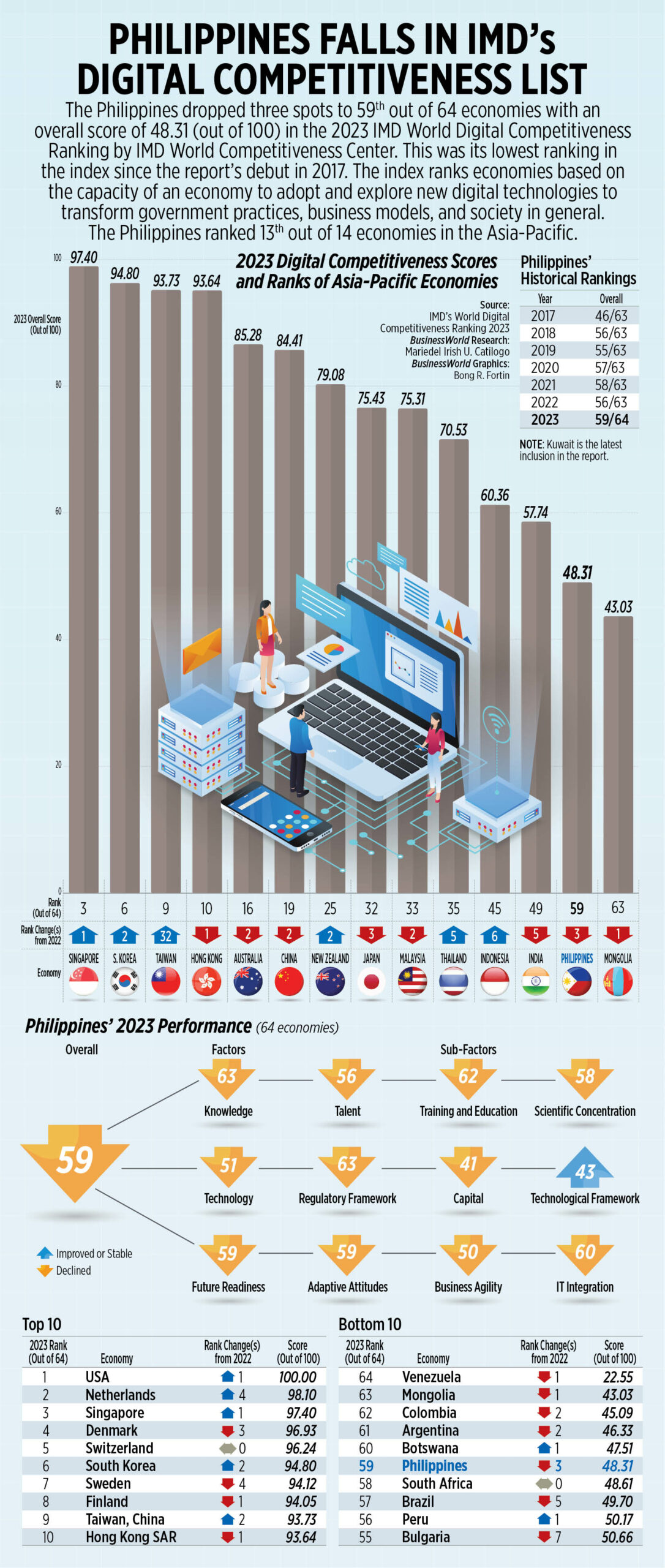




January Economic Update: Growth slows, prices rise
 DOWNLOAD
DOWNLOAD

Inflation Update: Up, up, and away?
 DOWNLOAD
DOWNLOAD

Quarterly Economic Growth Release: Growth takes on a slower pace
 DOWNLOAD
DOWNLOAD


Philippines drops three places in global digital competitiveness index

The Philippines dropped three spots in the global digital competitiveness index of the World Competitiveness Center of Swiss-based International Institute for Management Development (IMD), finishing at the bottom of its South-east Asian peers.
The country fell to 59th out of 64 economies, scoring 48.31 in IMD’s 2023 World Digital Competitiveness Ranking.
This was the Philippines’ lowest ranking since the index started in 2017. It was also among the lowest scorers at 13th place in the Asia-Pacific region, just ahead of Mongolia.
Singapore ranked the highest in the region with 97.4 points, followed by South Korea (94.8) and Taiwan (93.73). The three ranked third, sixth and ninth globally.
The index measures a country’s capacity to adopt and explore new digital technologies to transform government practices, business models and society in general.
It measures a country’s capacity in three key factors: knowledge or the quality of human capital, excellence of technological infrastructure and future readiness.
The Philippines ranked 63rd in the knowledge factor, 59th in future readiness and 51st in technology.
“In terms of technology, other countries are simply moving much faster than we are, thus we continue to slip in the ranks,” Jamil Paolo Francisco, executive director of the Asian Institute of Management Rizalino S. Navarro Poli-cy Center for Competitiveness, said in an e-mail.
“We need to cultivate a regulatory environment that supports innovation and adoption of new digital technologies, including artificial intelligence (AI) to serve the needs of our industries and workers,” he said. “We can also use these new technologies to improve the efficiency of government services and promote transparency.”
The country continued to lag its peers because of its “rigidity in adopting digital technologies,” Jose Caballero, senior economist at the IMD World Competitiveness Center, said in an e-mailed reply to questions.
“Looking at the three levels of readiness — adaptive attitudes, IT integration and business agility — the Philippines’ performance is deficient, which leads to a limited adoption of digital technologies,” he said.
He added that the drop in the country’s ranking was spurred by declines in all digital factors particularly in training and education, regulatory framework and IT integration.
The country’s sluggish performance in indicators related to institutional efficiency, such as the impact of its immigration laws (from 31st to 38th) and the institutional support for the development and application of technology (from 46th to 53rd) were concerns, Mr. Caballero said.
To improve its adaptability, the Philippines should focus on the development of its knowledge infrastructure.
“This is assessed through talent availability, training and education, and scientific concentration,” he said. “Strengthening aspects of talent development and education could enable greater overall digital adaptability.”
In its report, IMD said among the major weaknesses of the Philippines is the number of Filipino women with degrees, its regulatory framework for starting a business and enforcement of contracts.
Its strengths include its female researchers, investment in telecommunications, high-tech exports and attitude toward globalization and public-private partnerships.
Cybersecurity focus
Arturo Bris, director of IMD’s World Competitiveness Center, said the findings of this year’s World Digital Competitiveness Ranking provided a glimpse of how countries are approaching digital transformation in the age of artificial intelligence.
“While we measure no specific AI indicators, the technology sits silently at the core of several of the subfactors that we quantify — talent, regulatory and technological frameworks and adaptive attitudes and business agility,” he said in a separate statement.
There was an increased focus on cybersecurity, with only 5% of 4,000 executives saying that they had not implemented new cybersecurity measures in the past year.
“Cybersecurity becomes a clear example of the need to assess AI’s trade-offs and to take a very deliberate approach towards using it optimally,” Mr. Bris said. “Countries cannot do this in isolation but need to lean on regional if not global institutions to do so.”
Ronald Gustilo, national campaigner at Digital Pinoys, cited the need to improve the government’s response rate against cybercrimes.
“As many Filipinos fall victim to online scams and other cybercrimes, the government’s response rate and the implementation of programs that will equip the public against these schemes fall short,” he said in a Viber message.
Mr. Gustilo said the country’s dismal performance in the index could be attributed to Filipinos’ low level of understanding of the internet.
“The government should implement programs that will enrich the public’s knowledge of the internet. There is a compelling need to institutionalize digital literacy in basic and secondary education,” he added.
The Philippines was 62nd in training and education, which is under knowledge and measures a country’s employee training, education spending, higher education achievements and pupil-teacher ratio in tertiary education.
The three-notch drop in the country’s ranking might be partly attributed to rising prices, increased the cost of living and production costs, said Michael L. Ricafort, chief economist at Rizal Commercial Banking Corp.
“Due to higher interest rates since last year, the increased financing and borrowing costs weighed on investments and the creation of new jobs,” he said in a Viber message.
He said the government should address the concerns of foreign investors to boost foreign direct investments (FDI). These include high electricity prices, the sanctity of contracts and effective dispute resolution mechanisms, ease of doing business, infrastructure and institutions.
“FDIs facilitate the transfer of new and improved technology to the country, on top of creating more jobs and other business and economic opportunities,” he said. — By Justine Irish D. Tabile, Reporter
This article originally appeared on bworldonline.com





 By BusinessWorld
By BusinessWorld
